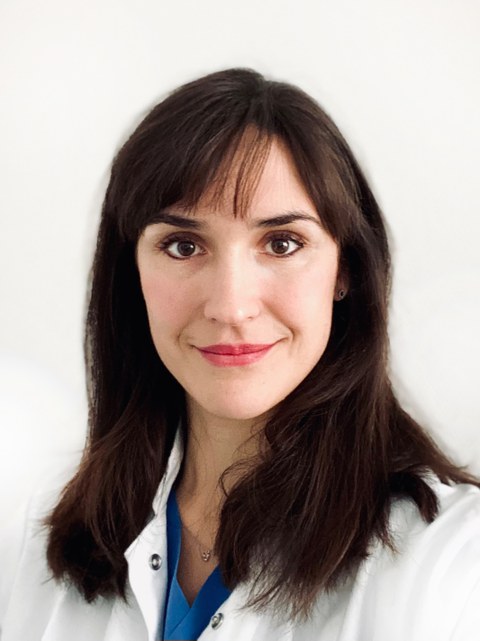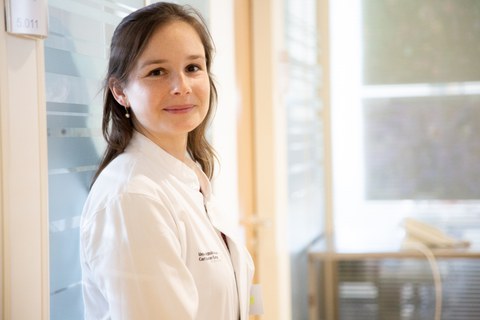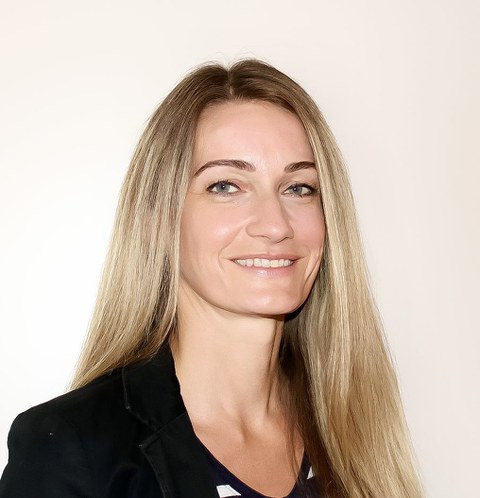Erfahrungen von Geförderten
Inhaltsverzeichnis
"Wie halten Sie es mit der Habilitation?" - 4 Fragen, 4 Antworten von Geförderten des Frauenhabilitationsprogramms
Dr. med. Micaela Ebert - Herzzentrum Dresden
Wann/in welchen Zusammenhang haben Sie das Thema Habilitation erstmals als Ziel für sich definiert?
Für mich war eigentlich schon immer klar, dass ich akademisch arbeiten möchte. Die Habilitation war damit eigentlich seit Beginn meiner ärztlichen Tätigkeit schon immer ein Ziel, das ich vor Augen hatte und mich motiviert ,meine bisherige wissenschaftliche Tätigkeit voran zu bringen.
Welche Ziele verfolgen Sie mit der Habilitation/Wo sehen Sie sich in 5 Jahren?
Die Habilitation sehe ich als besondere Honorierung meiner bisherigen akademischen Arbeit in Form von Lehre und klinisch orientierter Forschung und als Legitimation auf diesem Weg weiter befürwortet zu werden. Es ist wichtig für mich, diesen Meilenstein zu erreichen, um besser selbstständig zum Beispiel bei der Betreuung von Doktoranden arbeiten zu können und auch andere NachwuchswissenschaftlerInnen zu motivieren, mir auf diesem Weg zu folgen. Mein ultimatives Ziel ist eine eigene Arbeitsgruppe mit jungen, motivierten KollegInnen zu haben, diese zu fördern und auf Ihrem Weg einer wissenschaftlichen Laufbahn zu begleiten, zu mentorieren und zu unterstützen, so, wie ich das Glück hatte gefördert zu werden. Für mich stand immer fest, dass ich an einer Universitätsklinik arbeiten möchte und in 5 Jahren wäre das Anstreben einer Professur, die ich inhaltlich ausfüllen kann, der nächste Schritt auf meinem Weg.
In welcher Weise hilft Ihnen die MFD Habilitationsförderung für Frauen diesem Ziel näher zu kommen?
Mir neben klinischem Alltag und Familie die Freiräume zu schaffen und an meine Lebenssituation anzupassen, hilft mir enorm, meine persönlichen Ziele zu verfolgen und mich auf meine wissenschaftliche Karriere zu fokussieren. In dieser wertvollen Zeit kann ich Projekte initiieren, engmaschig meine Doktoranden betreuen, eigene Daten auswerten und Manuskripte schreiben und dabei kreativ sein, um neue Projektideen zu planen und zu realisieren.
Welchen Rat würden sie jüngeren Kolleginnen in Bezug auf ihre Karriereplanung mit auf den Weg geben?
Man muss ehrlich zu sich sein und sich immer wieder und in jeder Lebenslage die Frage beantworten: was ist mir wichtig und welchen Preis bin ich bereit dafür zu bezahlen. Dabei muss man sich selbst immer wieder die Frage beantworten, ob man noch „on track“ ist.
Wenn die äußeren Umstände, beispielsweise aufgrund von familiären Gründen/ Elternschaft den Weg der eigenen Karriere erschweren oder verlangsamen, dann ist das für einen Zeitraum einfach auch mal okay und gibt einem vielleicht sogar Kraft, um sich wieder sich selbst und der eigenen Karriere zu widmen! Dabei ist es essentiell, sich rechtzeitig eine Infrastruktur zu schaffen und sich zu fokussieren und strukturieren, um die Realisation dieser eigenen Ziele neben den Herausforderungen des Alltags zu ermöglichen. Diesbezüglich ist es aus meiner Erfahrung auch enorm wichtig sich frühzeitig zu überlegen, inwiefern man Großeltern oder Hilfe von außen (Freunde, Au-pair, Nanny…) involvieren kann, um mehr Freiräume für Wissenschaft und Klinik, für sich selbst und als Plan-B zu haben, wenn in unserem Beruf mal was „dazwischen“ kommt.
Ich glaube vor allem in der Rolle als Frau und Mutter neigt man dazu, häufig allen gerecht werden zu wollen und die eigenen Bedürfnisse hinten anzustellen. Das hat aber nichts mit Egoismus zu tun, sondern mit Selbstfürsorge und ist ein bisschen wie in der Luftfahrt, bei der man angehalten wird, immer erst die eigene Sauerstoffmaske aufzusetzen, bevor man anderen hilft und adäquat helfen kann (!).
Ohne äußere Hilfe ist es aus meiner Erfahrung so gut wie unmöglich, eine wissenschaftliche Karriere zu verfolgen und gleichsam eine gute Ärztin zu sein. Für mich war es enorm wichtig, Vorbilder zu haben bzw. MentorInnen, die mir Türen geöffnet und Wege aufgezeigt haben. Auch die richtige Partnerwahl ist entscheidend, denn in einer gleichberechtigten Partnerschaft/Familie, insbesondere in der beide Karriere machen wollen, geht das nur im Verbund und indem man sich gegenseitig unterstützt.
Dr. med. Undine Proschmann - Klinik und Poliklinik für Neurologie
Wann/in welchen Zusammenhang haben Sie das Thema Habilitation erstmals als Ziel für sich definiert?
Nachdem ich mich entschlossen hatte, auch nach der Promotion neben der klinischen Tätigkeit weiterhin wissenschaftlich aktiv zu sein, habe ich mich entschieden, im Verlauf zu habilitieren.
Welche Ziele verfolgen Sie mit der Habilitation/Wo sehen Sie sich in 5 Jahren?
Die Habilitation soll mir ermöglichen, eigenständig meine Forschungsprojekte voranzubringen und selbstständig Doktoranden zu betreuen sowie Lehre durchzuführen. In fünf Jahren möchte ich eine klinisch und wissenschaftlich tätige Oberärztin sein und jüngeren Kollegen dabei helfen "ihren Weg zu gehen".
In welcher Weise hilft Ihnen die MFD Habilitationsförderung für Frauen diesem Ziel näher zu kommen?
Die Freistellung im Rahmen der MFD Habilitationsförderung für Frauen ermöglicht mir, eine zeitnahe Fertigstellung der für die Habilitation notwendigen Publikationen und die Verfassung der Habilitationsschrift.
Welchen Rat würden sie jüngeren Kolleginnen in Bezug auf ihre Karriereplanung mit auf den Weg geben?
Auch wenn die Verknüpfung von klinischer Tätigkeit und Forschung v. a. als Frau nicht immer einfach ist, so lohnt es sich doch dranzubleiben und seine Ziele nicht aus den Augen zu verlieren. Sehr wichtig sind gute Mentoren, Vernetzung und geregelte Freistellungen für die Forschung.
Dr. med. Katja Sockel - Medizinische Klinik und Poliklinik I
Wann/in welchen Zusammenhang haben Sie das Thema Habilitation erstmals als Ziel für sich definiert?
Tatsächlich habe ich mich erst relativ spät (nach Abschluss meiner Facharztweiterbildung) ernsthaft mit dem Thema Habilitation auseinandergesetzt. Während meiner ärztlichen Ausbildung konnte ich an verschiedenen klinisch-wissenschaftlichen Projekten mitwirken und mich hierdurch mit Herausforderungen und Möglichkeiten der Forschung vertraut machen. Nach mehrjähriger klinischer Tätigkeit waren es aber vor allem die, im Rahmen der täglichen klinischen Praxis identifizierten „Medical needs“ meiner Patienten, die mich motiviert haben selbstständig nach Lösungsansätzen zu suchen und eigene Forschungsprojekte zu initiieren.
Welche Ziele verfolgen Sie mit der Habilitation/Wo sehen Sie sich in 5 Jahren?
Ziel meiner Habilitation ist es, zukünftig selbstständig wissenschaftliche Projekte zu leiten und Doktoranden zu betreuen, um zur Verbesserung der Patientenversorgung beizutragen.
In 5 Jahren sehe ich mich daher weiterhin an einer universitären Einrichtung, an der ich die Infrastruktur und das Umfeld zur Umsetzung meiner Forschungsaktivitäten finde und auch direkten Zugang habe, die gewonnen Erkenntnisse in die alltägliche klinische Praxis zu implementieren. Ich hoffe, sowohl beruflich als auch persönlich durch vielfältige Herausforderungen weiter gewachsen zu sein. Darüber hinaus würde ich mich freuen, wenn ich junge Ärzte und vor allem Ärztinnen motivieren bzw. unterstützen könnte, neben einer engagierten klinischen Arbeit auch wissenschaftlich tätig zu werden.
In welcher Weise hilft Ihnen die MFD Habilitationsförderung für Frauen diesem Ziel näher zu kommen?
Ich denke, wir können uns in Dresden sehr glücklich schätzen, dass es die MFD Habilitationsförderung für Frauen gibt, mit deren Hilfe der oft nicht einfache Spagat zwischen guter klinischer Tätigkeit, Forschungsaktivität und Familienmanagement realisierbar scheint. In meinem Fall ermöglicht mir die 50%ige Teilförderung neben meiner klinischen Tätigkeit als Oberärztin, zeitliche Ressourcen zu schaffen, um Publikationen abzuschließen, die Habilitation voranzutreiben und neue Projekte auf den Weg zu bringen. Darüber hinaus bietet das Habilitationsprogramm organisatorische Unterstützung und Mentoringprogramme, die helfen, das Ziel der Habilitation und einer selbstbewussten wissenschaftlichen Karriere zu erreichen.
Welchen Rat würden sie jüngeren Kolleginnen in Bezug auf ihre Karriereplanung mit auf den Weg geben?
Wenn möglich, frühzeitig Ziele zu setzen, Chancen zur Weiterbildung und Forschung nutzen, insbesondere auch im Ausland. Und auch wenn sich der Wunsch einer eigenen wissenschaftlichen Karriere erst später heraus kristallisiert, lohnt es sich diesen Plan zu verfolgen. Wichtig ist Eigeninitiative und sich aktiv um Unterstützung (nicht nur beim Klinikchef, sondern vor allem auch um Einwerbung von Sach- und Personalmitteln zur Umsetzung seiner Forschungsvorhaben) zu bemühen. Rückschläge sollten dabei nicht entmutigen, sondern vielmehr als Teil des Prozesses betrachtet werden, der einen weiter vorantreibt.



